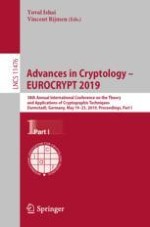2019 | OriginalPaper | Buchkapitel
Continuous Non-Malleable Codes in the 8-Split-State Model
verfasst von : Divesh Aggarwal, Nico Döttling, Jesper Buus Nielsen, Maciej Obremski, Erick Purwanto
Erschienen in: Advances in Cryptology – EUROCRYPT 2019
Aktivieren Sie unsere intelligente Suche, um passende Fachinhalte oder Patente zu finden.
Wählen Sie Textabschnitte aus um mit Künstlicher Intelligenz passenden Patente zu finden. powered by
Markieren Sie Textabschnitte, um KI-gestützt weitere passende Inhalte zu finden. powered by
